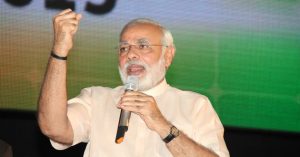Memo #292
By Geoffrey Macdonald – GPMacdonald [at] gmail.com
 Polling indicates that the Bharatiya Janata Party (BJP) will be announced next week as the clear winner of India’s scheduled parliamentary elections. With this result, the worst fears of many Indians and international observers will be realized: Narendra Modi, who is banned from entering the United States for his alleged complicity in Gujarat’s 2002 anti-Muslim riot, will become prime minister of India.
Polling indicates that the Bharatiya Janata Party (BJP) will be announced next week as the clear winner of India’s scheduled parliamentary elections. With this result, the worst fears of many Indians and international observers will be realized: Narendra Modi, who is banned from entering the United States for his alleged complicity in Gujarat’s 2002 anti-Muslim riot, will become prime minister of India.
As polling began to indicate an easy win for the Hindu nationalist BJP, commentators made ominous predictions about India’s future. The Times of India speculated that Muslims would become politically “irrelevant.” The Guardian editorialized that Modi’s conservative Hindu politics would be bad for women’s rights. The Economist asked gloomily, “Can anyone stop Narendra Modi?” A prominent Muslim MP told me last year that there would be civil war if Modi became the next prime minister of India.
But what is the likelihood of the BJP implementing an extremist Hindutva agenda? If history is any guide, it’s not likely at all. The BJP governed India from 1998 to 2004, during which it was forced to abandon its most divisive issues in order to build and retain an ideologically diverse governing coalition. India’s highly fragmented majoritarian politics—a strikingly unusual dynamic—make it virtually impossible for a party to win a majority of seats in the parliament. Since 1989, India’s unwieldy ruling coalitions have inhibited executive power. Though the BJP is likely to win a strong plurality, its rule will still require a coalition.
This electoral imperative for moderation is seen during election campaigns. My research on India’s 2009 election shows that the BJP’s rhetoric focused overwhelmingly on development rather than division. While Hindutva politics have undeniably infiltrated the BJP’s oratory in 2014, its campaign focus has again been Gujarat’s model of economic growth. The BJP’s centrist strategy was on display during Modi’s late-campaign denunciation of a BJP colleague’s anti-Muslim comments.
Unrestrained power in the hands of Modi and the BJP would likely have terrible consequences for India’s minority communities. But the nature of the country’s majoritarian system places strong coalitional constraints on the ruling party. The Indian parliament’s debilitating fragmentation and inefficiency will finally have a positive effect.
Author’s post-election update (May 19, 2014): The magnitude of the BJP’s victory defied pre-election polling and thirty years of political history. No single party had won a majority of seats in India’s Lok Sabha since 1984. The BJP’s national popularity is due in part to a continued shift away from its traditional Hindutva agenda and toward a promise of economic prosperity. However, if India’s economy continues to decline, will the BJP return to divisive social issues to maintain support? With no meaningful coalition there will be few short-term restraints to prevent it.
About the Author:
Geoffrey Macdonald is an adjunct professor at the University of Denver’s Josef Korbel School of International Studies. In 2012-2013, he conducted research on Indian party politics as a Fulbright Scholar at the Institute of Social Sciences in New Delhi.
Links:
- “Can Anyone Stop Narendra Modi?,” The Economist, April 2014
- “Narendra Modi as prime minister would roll back women’s rights in India,” The Guardian, April 2014
- Niraja Gopal Jayal and Pratap Bhanu Mehta (eds.), The Oxford Companion to Politics in India, Oxford University Press, 2011
- Christophe Jaffrelot, Religion, Caste and Politics in India, Columbia University Press, 2011
- Centre for the Study of Developing Societies, New Delhi, India
Related Memos:
See our other memos on India.

Comments are closed, but trackbacks and pingbacks are open.